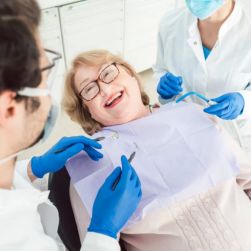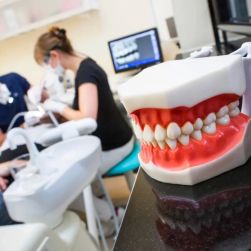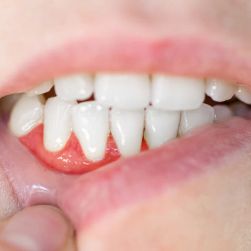What to Know About Laser Dentistry and Its Benefits
If you're like me, visiting the dentist can sometimes feel like a daunting experience. The sound of the dental drill, the feeling of discomfort during procedures—these are all too familiar for many people. But then, I discovered something that completely changed my perspective: laser dentistry. Over the years, laser technology has revolutionized dental care, offering a less invasive and often more comfortable alternative to traditional methods. In this article, I’m excited to share what I’ve learned about laser dentistry and the incredible benefits it offers.
1. What is Laser Dentistry?
Laser dentistry involves the use of focused light beams to treat a variety of dental issues. The laser can remove or reshape soft and hard tissues in the mouth, providing a precise and effective treatment with minimal discomfort. Lasers in dentistry can be used for various procedures, from teeth cleaning and cavity treatment to more complex procedures like gum reshaping or root canal therapy.
I first encountered laser dentistry during a routine cleaning. My dentist explained that lasers could be used to eliminate bacteria below the gum line, leading to healthier gums. I was intrigued, especially after hearing that lasers could also minimize the discomfort I had experienced in the past with traditional dental tools.
2. Types of Laser Treatments in Dentistry
Laser dentistry isn’t just one-size-fits-all—it’s a versatile technology used for a wide array of dental procedures. From my own experiences and research, I’ve discovered that lasers can be used for both soft tissue and hard tissue procedures, depending on the type of laser used. Let me break down some common laser dental treatments:
1. Teeth Whitening
Laser teeth whitening is one of the most popular treatments available. A concentrated laser light is used to activate a whitening gel applied to the teeth, speeding up the whitening process. I’ve tried this method, and it’s a game-changer—my teeth felt cleaner, brighter, and it didn’t take hours in the dentist’s chair!
2. Laser Cavity Detection
Laser dentistry can also be used for cavity detection. A special laser helps identify cavities in their earliest stages, which can lead to earlier treatment and less invasive procedures. I can’t stress enough how much I appreciate the non-invasive nature of this technology—no drilling, no scraping, just quick and accurate results.
3. Gum Disease Treatment
Laser treatments are incredibly effective for treating gum disease. The laser can be used to remove infected tissue, promote healing, and reshape the gums. In my case, after using lasers to treat my gum disease, I noticed faster recovery times and much less discomfort compared to traditional gum treatments.
4. Soft Tissue Treatments
Laser dentistry can also be used for soft tissue procedures such as frenectomy (removal of tissue connecting the lip to the gum) or reshaping the gums. These treatments are ideal for anyone looking for less discomfort and a faster recovery time. I had a frenectomy done using laser technology, and the experience was surprisingly smooth. There was minimal swelling, and I didn’t need stitches.
3. The Benefits of Laser Dentistry
Now that you know what laser dentistry can do, let's dive into the specific benefits. From my personal experiences and the research I’ve done, here are some of the top reasons why laser dentistry is such a breakthrough in the world of dental care:
1. Less Pain and Discomfort
One of the biggest benefits of laser dentistry is the reduction in pain. I’ve had traditional dental work done, and I’ve experienced the discomfort associated with it—especially with deep cleanings or cavity fillings. With lasers, the treatment is often less invasive, which means less pain during and after the procedure. The laser beam helps reduce bleeding, swelling, and the need for anesthesia in many cases.
2. Faster Recovery Time
Since laser treatments are less invasive, they often promote faster healing times. I was amazed at how quickly my gums healed after a laser treatment for gum disease. I was able to resume my normal activities without the downtime typically associated with traditional dental procedures.
3. More Precise and Targeted Treatment
Laser dentistry offers a high degree of precision, which means less damage to surrounding tissues. This accuracy is especially important when working on sensitive areas like the gums or teeth. In my case, the laser’s pinpoint focus meant that I could get the results I needed without the discomfort and risk of tissue damage that sometimes happens with traditional tools.
4. Reduced Risk of Infection
Because lasers are sterilizing, they reduce the risk of infection after a procedure. I’ve always been cautious about infections after dental work, but with laser treatments, the chances of infection were significantly lower. The laser helps sterilize the treatment area during the procedure, promoting a cleaner and healthier environment for healing.
5. No Need for Stitches
In many soft tissue procedures, the use of lasers means there’s no need for stitches. I had a gum reshaping procedure that required no stitches, which meant I didn’t have to worry about any post-treatment discomfort or a long recovery time. The laser sealed the wound as it worked, and the result was faster healing and a smoother recovery process.
4. Is Laser Dentistry Right for You?
Laser dentistry offers many benefits, but it’s not for everyone or every situation. While it’s a great option for many procedures, there are still cases where traditional methods might be more appropriate. For example, complex root canal treatments or very deep cavities may still require traditional dental tools.
However, for anyone seeking a less invasive, faster, and more comfortable dental experience, laser dentistry is definitely worth considering. If you’re apprehensive about the pain of traditional dental procedures, I highly recommend discussing the option of laser treatments with your dentist. I was initially nervous too, but after seeing the results firsthand, I’m a true believer in the power of laser dentistry.
5. Finding a Dentist Who Specializes in Laser Dentistry
Not all dentists offer laser treatments, so it's essential to find a dentist who is experienced with this technology. I recommend looking for a dentist who is certified in laser dentistry and has experience using lasers for various procedures. Many dentists now offer laser treatments, especially those in more advanced or cosmetic dentistry practices.
When you find the right dentist, you’ll be able to explore all the ways that laser dentistry can enhance your dental care experience. It’s a growing field, and more people are discovering the benefits of this advanced technology every year.






